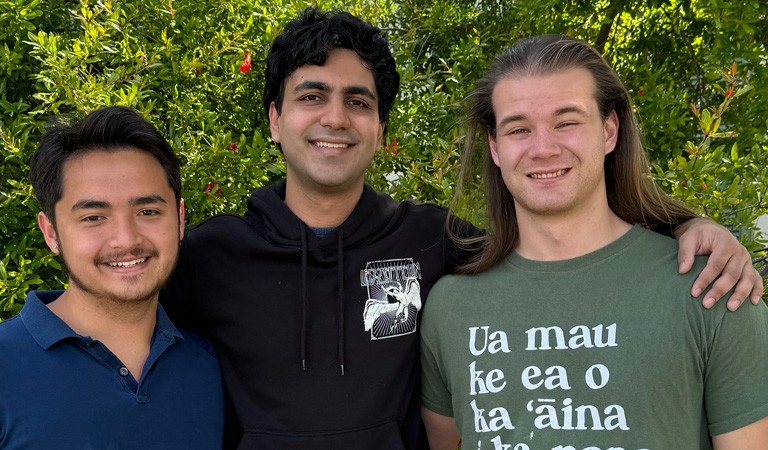Harvey Mudd is Top Team in International Math Modeling Competition
May 14, 2024
Among the 30,000 teams competing in the 2024 International Mathematical Contest in Modeling and Interdisciplinary Contest in Modeling (MCM/ICM), Harvey Mudd College fielded five teams that successfully completed the four-day contest held in February.
One Harvey Mudd team earned the designation of Outstanding in the 26th annual Interdisciplinary Contest in Modeling, placing in the Top 18 out of 10,000 teams participating in the ICM. Their solution was recognized with a Mathematical Association of America Award and with the International COMAP Scholarship Award, given to the Top 4 MCM/ICM teams. COMAP awardees received $9,000 for the team and $1,000 for the school.
Harvey Mudd’s top team consisted of Max Collins ’25 (mathematics major), Paco Navarro ’25 (math and physics major) and Arjun Taneja ’25 (computer science and math major), three friends who have developed a strong rapport by taking classes together and working on various projects. “Teaming up with them is what made the contest worth doing,” said Taneja.
Before the contest, Collins, Navarro and Taneja received advice from Harvey Mudd mathematics professors Susan Martonosi and Jamie Haddock—co-coordinators of the MCM/ICM Seminar—and Heather Zinn-Brooks. Martonosi and Haddock gave all Harvey Mudd teams practical advice on how to approach the contest and how to manage time. Students work in teams of up to three students and have 96 consecutive hours to develop a mathematical model and write a formal paper describing their work. The team’s papers are judged not only on their scientific and mathematical accuracy, but also on their clarity of exposition, insight and creativity. Collins, Navarro and Taneja spent most of their time bouncing ideas off each other and making their report “readable, comprehensible and beautiful.”
“As we have learned from our time at Mudd, these are extremely important but often overlooked parts of math communication,” said Collins, Navarro and Taneja.
Their winning report was titled, “Dynamic Dams Model: A Multigranular, Human-Centered Approach for Modeling Water In The Great Lakes.” One of three ICM problems—the others dealt with the sustainability of property insurance and reducing illegal wildlife trade—the challenge required teams to develop a dynamic model of the water levels in the Great Lakes. After determining the optimal water levels for the system, teams established algorithms that could be used by the two existing water-level control mechanisms to maintain optimal levels within the system.
“Paco really liked this problem because, being from Minnesota, he has a personal connection to the Great Lakes,” said Taneja. Collins, Navarro and Taneja also liked the theme of the problem: operations research/network science.
The team members remarked, “We had taken an operations research course with Professor Martonosi in fall 2023, and we really enjoyed it. We could see how the material we learned in class could be readily applied to this problem, so we concluded there was a good deal of potential in doing it.”
“This is quite an achievement, and we are so proud of these students,” said Martonosi.
Ben Fusaro, creator of the contest in 1983, described the MCM/ICM: “Most problems that come up in business, government, or industry are solved by teams, are likely to take many hours, and would not be restricted to using only pencil and paper. Moreover, the answer must be presented to an executive who wants a clear, understandable response.”
A selection of the Outstanding summaries will be featured in The UMAP Journal, along with commentaries from the problem authors and judges. This year’s judges remarked that due to the multidisciplinary nature of the problems, teams solved these problems using a variety of methods and tools. This allowed teams to showcase their strengths in many diverse areas including climate science, data science, dynamical systems, economics, environmental science, network science, policy, statistics and sustainability.
All participating HMC teams
• Arjun Taneja, Paco Navarro, Max Collins– ICM Problem D– Great Lakes Water Problem
• Akshay Seetharam, Sudharsan Gopalakrishnan, Tessa Han– ICM Problem F: Reducing Illegal Wildlife Trade
• Anshuman Singh, Ananya Venkatachalam, Mithra Karamchedu– ICM Problem F: Reducing Illegal Wildlife Trade
• Otis Golden, Ashley Kim, Theo Julien– MCM Problem C: Momentum in Tennis
• Saheli Patel, Emilynne Newsom– MCM Problem A: Resource Availability and Sex Ratios
